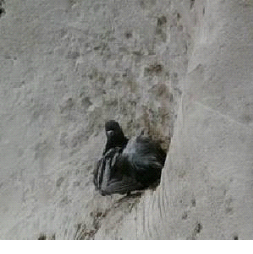Portion of the Week: Vayikra (Leviticus 1:1 – 5:26)
‘ואם מין העוף עולה קרבנו לה”
“והקריב מן התורים ומין בני יונה את קרבנו
“If he is to bring an offering that is to be eaten to the Eternal then he shall bring it from the ‘Torim’ Doves and from the Doves”
This week’s portion fits in very well with the official start of my blog, for it is the official start of a new reading of a book of the Pentateuch; ‘Vayikra’ (Leviticus: the Laws of Priesthood or in Hebrew ‘He Called’). It also contains a very important concept to Jews; Peace.
The quote above is dealing with the laws concerning a person who wishes to offer a bird as an offering to the Eternal one. According to this verse, one can only offer either a Dove or a Rock pigeon. But this is very confusing as any decent bird watcher will instantly tell you; Rock pigeons (the Grand Daddy of our City Pigeons) are a type of Dove.
Why can’t you just say; ‘bring me your Doves !’ or some thing like that?
Also, why Doves? Why can’t you bring chicken? Most good Jews eat chicken (apart from vegetarians, I’m a veggie too, I was upset by the lack of a tofu sacrifice, but that’s a discussion for another time). There is a special significance to this choice of bird.
Most commandments are connected to the reality of the situation of the Children of Israel or the reality that they would face in the Holyland. There are 4 main kinds of Dove that visit Israel, the first was captured on camera by a friend:
The Rock Dove / Pigeon

(picture courtesy of Remi Rauh)
The Collared Dove
The Turtle Dove
Laughing Dove
All of the four fit into the general category ‘Dove’ or ‘Yonah’, the first three, according to scripture, can be categorised as ‘Tor’ in Hebrew, what I have called “‘Torim’ Doves”, the last is part of the Global Category of Doves and Pigeons (see ‘Daat Mikra’ published by Mosad HaRav Kook on this verse who names the first three categories). The first of the three the Rock Dove or Columbia Livia in Latin were commonly used in the ancient Middle East as farmed edible foul. It was very common to have a Columbarium (an underground cave with niches for the housing of doves, now means a mausoleum but originally came from the word ‘Columba’ in Latin meaning Dove) attached to a house as part of the family’s food supply. The picture below was taken in the ruins of a large settlement outside Jerusalem called Maresha, which contains a vast number of underground Columbaria including this massive one which also became a Church and later on a Mosque.

(Columbarium of Beit Guvrin courtesy of Remi Rauh)
It is even suggested that before their domestication it was fairly easy to catch a dove and these are the kind that frequented Israel. So the text is telling us, ‘bring an offering from the ‘Torim’ these are the easiest to find, if not buy a ‘Dove’, it gives us the easiest option first as the more preferable one. This sacrifice is to do with Hesed ; loving-kindness to the person bringing the sacrifice, that it should be a service to the Eternal which is easy to accomplish.
There is a much deeper reason why the Dove is used at all. The Dove is first mentioned in connection with Noah, it is the Dove that heralded the end of the flood and became for eternity the international symbol of Peace. The Great Rabbis said;
‘It is better to be one of the pursuers than one of the pursued and there is none pursued more than the ‘Torim’ Dove and the Dove’ (Babylonian Talmud, Tractate Baba Kama 93 side A, quoting Rabbi Abahu).
This has a dual meaning, firstly it is a message to be essentially a peaceful person (I do n’t think it means get yourself killed, anybody who has tried to trap birds knows that they certainly struggle and if you want proof I’ll happily take you to a Dove ringing at one of the many Bird Survey centres in Israel and prove this to you). Secondly it means to be a person who is at peace with the service of the eternal, it is evident from the many columbarium in the environs of Jerusalem that they were the most common thing to be sacrificed at the temple, the easiest thing for a person to get hold of to serve the Holy One. The message we are given is that we should ourselves be resigned in peace to divine service both with ourselves and with others.
